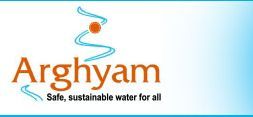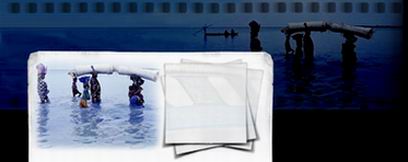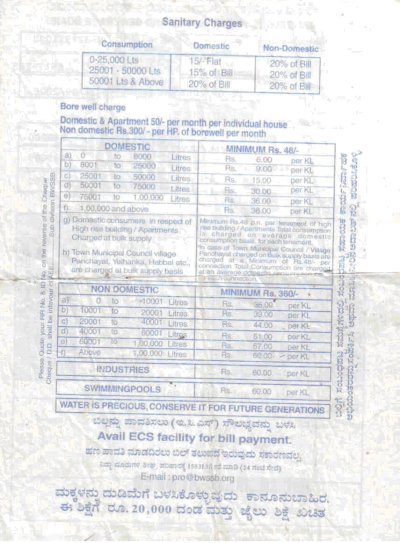Karnataka
Basic course on fluorosis and fluoride removal (part 4 of 4)
Posted on 19 May, 2009 11:58 AMThe course starts from the basics of what fluoride is, sources of fluoride intake, how fluoride enters water and the symptoms of fluorosis. It explains the ways of solving this problem with a special emphasis on rainwater harvesting as a source of uncontaminated drinking water.
Hydrogeology in watershed planning - a presentation by Advanced Center for Water Resources Development and Management
Posted on 18 May, 2009 01:17 PMThe presentation ends by making the following points:
Job opening: Research coordinator, Arghyam
Posted on 16 May, 2009 05:24 AM Arghyam Trust based in Bangalore, (www.arghyam.org) focuses solely on water and sanitation with an emphasis on domestic water. We are looking to employ a young dynamic person to be a core member of a new Research & Developmentgroup.
Arghyam Trust based in Bangalore, (www.arghyam.org) focuses solely on water and sanitation with an emphasis on domestic water. We are looking to employ a young dynamic person to be a core member of a new Research & Developmentgroup.
Drinking water access in Bangalore through the framework of human rights: a PhD dissertation
Posted on 12 May, 2009 04:55 PMThis PhD dissertation by Jenny T Gronwall for Linkoping University's Tema Institute looks at issues of drinking water access in Bangalore through the framework of human rights, analyzing three interlinked dimensions: the right to water as a human right; water in terms of property rights; and water rights.
Civic engagement and transparency for good governance - a case study of NGO task force in Mangalore
Posted on 11 May, 2009 04:23 PMThe management arrangements and governance of the city have to be viewed at three levels by Mangalore city corporation (MCC).
- Firstly, the responsibility of providing urban services within the boundary of city (both obligatory and discretory in nature). This is normal with other cities.
- Secondly, the responsibility to meet the demands generated out of economic activities beyond city limits. For example, incoming and outgoing trucks transporting logs, granite stone and groceries generate employment for locals. The city has to respond to provide minimum facilities in such a situation.
- Thirdly, involvement in to the infrastructure development activities initiated by the state government. The expansion of economic activities beyond city limits can be due to the regional development plan of the state government or the idea of regional development is based on the expansion of economic activities of the area. These externalities are interlinked.
Environment action plan for the city by Bangalore water supply and sewerage board
Posted on 11 May, 2009 12:38 PMThis presentation by the Bangalore Water Supply and Sewerage Board deals with the Environment Action Plan (Part – B) for Bangalore. The presentation begins with a description of the drainage pattern of the city and the major rivers in and around it. The objectives of the EAP are set out as –
- Stopping flow of raw sewage into storm water drains.
- Achieving zero discharge of raw sewage into drains.
- Conveying sewage to treatment plants and treating to meet standards.
- Improving environment.
- Improving socio-economic status.
Using GIS in water management system: case study of Bangalore Water Supply and Sewerage Board
Posted on 11 May, 2009 12:30 PMBangalore Water Supply and Sewerage Board (BWSSB) moved forward on developing a GIS in 1998-99 and along with other civic bodies of Bangalore (BDA , BMP, BESCOM and others) pooled resources for obtaining aerial photography and photogrammetrically compiled base map covering an area of 290 Sq Kms of Ban
Waternama - a collection of traditional practices of water conservation and harvesting in Karnataka
Posted on 08 May, 2009 05:16 PMWaternama is a collection of traditional practices for water conservation and management in Karnataka. The book is produced by Communication for Development and Learning and edited by Sandhya Iyengar.
View/download the full book (29.2 MB)
Voices from the Waters 2009: Call for entries, 4 Sep -7 Sep 2009, Bangalore
Posted on 07 May, 2009 10:20 AM Bangalore Film Society, Arghyam, Svaraj- Society for Voluntary Action Revitalization and Justice, Finger Lakes Environmental Film Festival, Ithaca College, USA (FLEFF) Mountainfilm in Telluride, USA, Alliance Francaise de Bangalore, Max Mueller Bhavan, Bangalore, Charter of Human Responsibilities and Water Journeys - Campaign for Fundamental Right to Water are organizing the fourth edition of the largest international film festival on water - Voices from the Waters 2009 from Friday 4th September, 2009 to Monday 7th September, 2009. Established in 2005 to promote among the public an awareness of the myriad water-issues affecting our everyday lives either directly or indirectly and as a platform for alternate voices and views rarely heard in mainstream, Voices from the Waters started as a Bangalore-based Environmental Film Festival and over the 2007 and 2008 editions grew to be one of the largest, most diverse and dynamic platforms of debate, dialogue and celebration of the precious resource, the blue gold, life itself - water.
Bangalore Film Society, Arghyam, Svaraj- Society for Voluntary Action Revitalization and Justice, Finger Lakes Environmental Film Festival, Ithaca College, USA (FLEFF) Mountainfilm in Telluride, USA, Alliance Francaise de Bangalore, Max Mueller Bhavan, Bangalore, Charter of Human Responsibilities and Water Journeys - Campaign for Fundamental Right to Water are organizing the fourth edition of the largest international film festival on water - Voices from the Waters 2009 from Friday 4th September, 2009 to Monday 7th September, 2009. Established in 2005 to promote among the public an awareness of the myriad water-issues affecting our everyday lives either directly or indirectly and as a platform for alternate voices and views rarely heard in mainstream, Voices from the Waters started as a Bangalore-based Environmental Film Festival and over the 2007 and 2008 editions grew to be one of the largest, most diverse and dynamic platforms of debate, dialogue and celebration of the precious resource, the blue gold, life itself - water.
